Do Defenses Really Win Championships?
By Alex Laughlin | December 10, 2024

"Offense wins games, defense wins championships." It’s one of the most commonly uttered phrases among NFL fans and media alike, alongside “take care of the football” and “next man up.” In the past decade, however, there’s certainly been a shift. Teams are running the ball less, throwing it more, and scoring has increased. Quarterbacks run the NFL, for better or worse, making it tough to imagine that defense is what powers championship teams. This study takes a look at the top 32 offenses and defenses from 2018-2023 by EPA/play, comparing the performances of the best offensive teams over the last six years with those of the top defensive teams. With five teams appearing in both categories, we have 59 unique teams to work with.
Of these 59 teams, 12 missed the playoffs. Among these teams, eight were driven by defense, including two of the top ten defenses within our sample (‘19 PIT & ‘23 NYJ), while the other four were offense-driven. The first part of the cliche, “offense wins games,” is supported by this stat; 88% of our elite offenses made the playoffs, while only 75% of our elite defenses did. What we’re really curious about, however, is what happens in the playoffs. Do defenses win championships, or has offense taken over in the postseason as well?
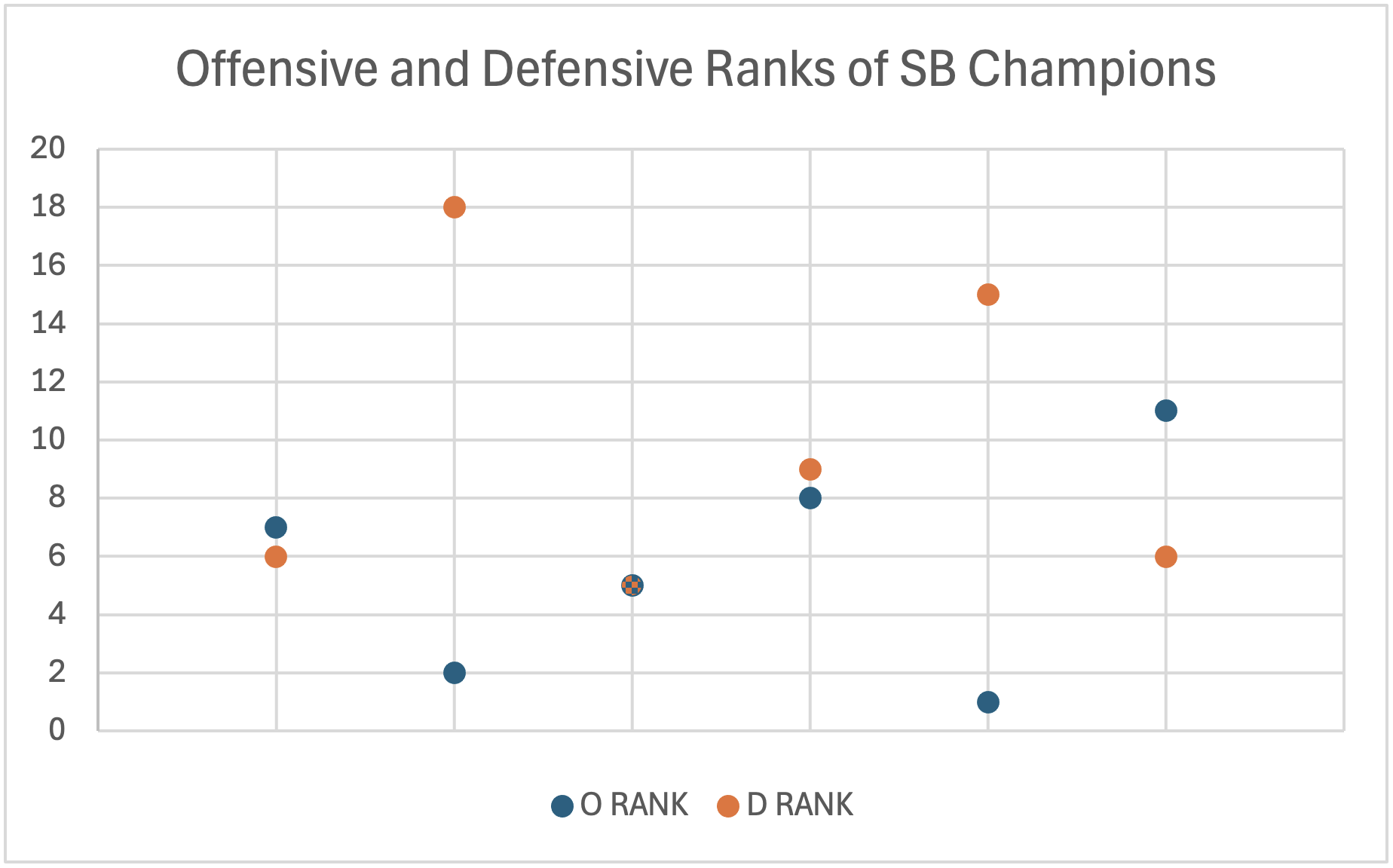
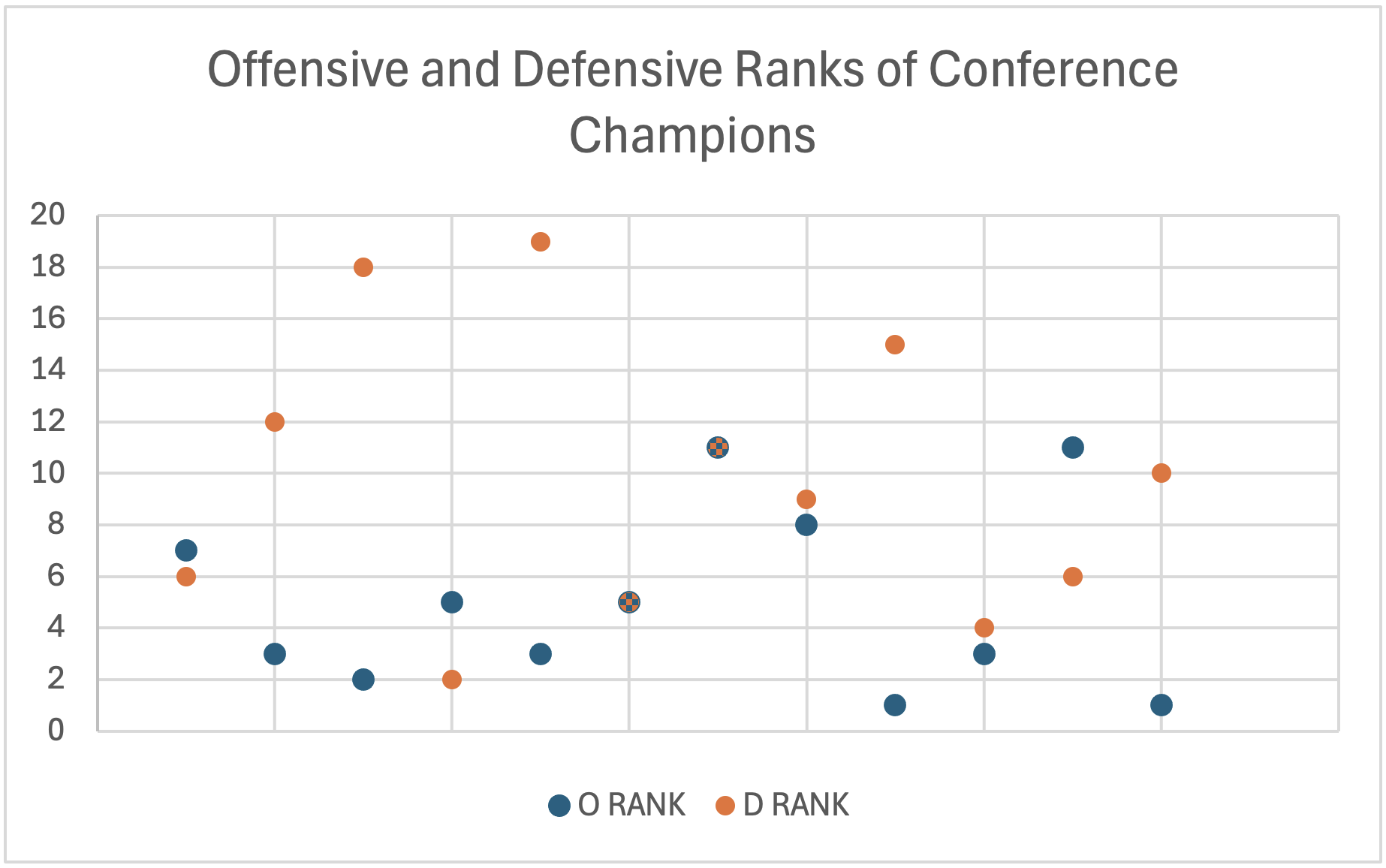
Looking at just Super Bowl champions, all except for one had a top-8 offense. Meanwhile, defenses could seemingly be ranked anywhere in the top-20 and have a shot. Additionally, only two championship teams had better offenses than defenses, and only one top-5 defense has won a Super Bowl in the last 6 years. Expanding our scope to include conference champions, seven teams were led by their offenses while only three had a better defense. Of the ten worst units to make a Super Bowl, seven were defenses. This suggests that, even in the playoffs, great offenses can carry subpar defenses while superior defenses have trouble doing the same for their teams. Only looking at Super Bowl participants doesn’t give us the full picture, though; there are more than two teams that matter in a given year. Examining all of the teams in our dataset gives a much more accurate and inclusive understanding of what’s going on.
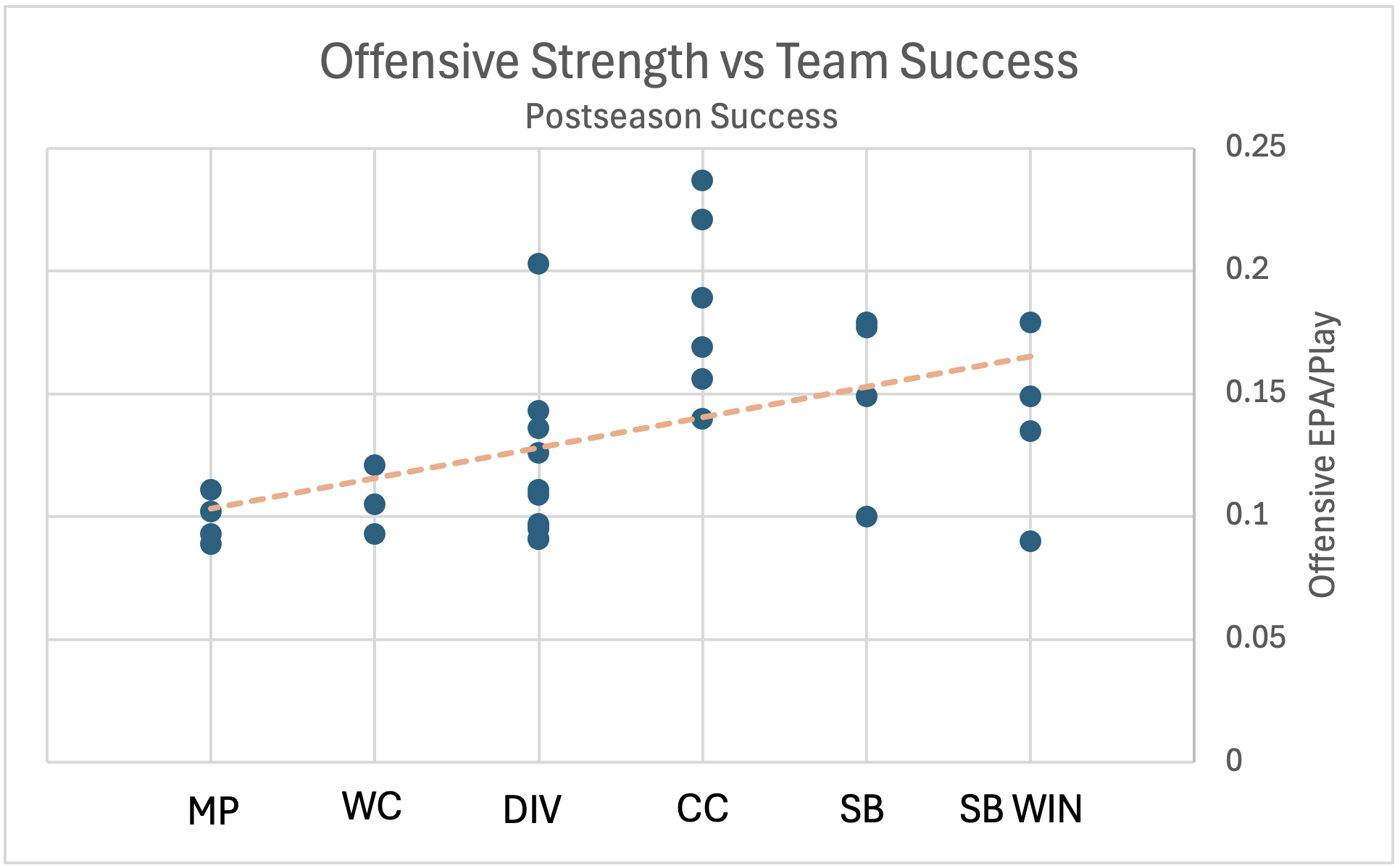
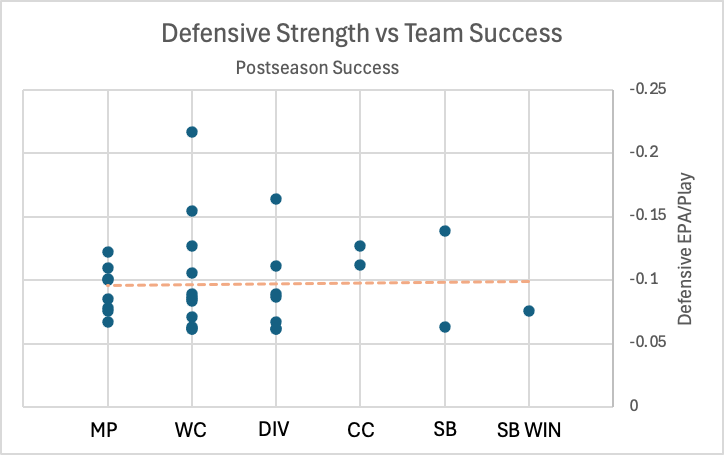
Looking at offense first, it’s clear that regular season offensive strength has a significant correlation with postseason success. Four of the last six Super Bowl winners had elite offenses, and more elite offenses made the Super Bowl than lost in the Wild Card or earlier. To reiterate, strong offensive teams made the Super Bowl more often than they lost before the Divisional Round. Elite defensive teams, on the other hand, often struggled in the playoffs, defensive strength barely correlating with success. Defensive teams only appeared in three Super Bowls, their only win coming from a team led by Patrick Mahomes (and the two losses coming against his offenses). 63% of elite defensive teams lost before the Divisional Round, compared to only 22% of the offensive teams we’re studying. Strong offensive units can carry their teams through the playoffs, but teams that rely on defense struggle to make up for deficiencies on the other side of the ball. Interestingly, of the five teams that had both elite offenses and defenses, only one made it past the divisional round. That’s right – of the five most well-rounded teams of the last six years, only one of them won more than a single playoff game. Maybe that just comes down to sample size, but it could also say something about football’s natural variance. As a sport that thrives on parity, this kind of disorder is part of what makes the NFL so entertaining.
Sometimes, teams just get hot at the right time; maybe they didn’t rank too highly on either side of the ball during the regular season, but played above expectation in the playoffs and strung enough wins together to make some noise. This does happen occasionally – neither conference champion in 2021 (CIN & LAR) had an elite offense or defense in the regular season. The Super Bowl Champion Rams, in particular, are interesting, as their offense actually got worse in the playoffs. Meanwhile, their defense ascended to allowing just -0.151 EPA/play, a mark that would set them as the 4th best regular season defense since 2018. Perhaps it’s the case that for defenses, regular season play simply isn’t very predictive of postseason play, and teams that have large differences in defensive play between the regular and postseasons are more successful.
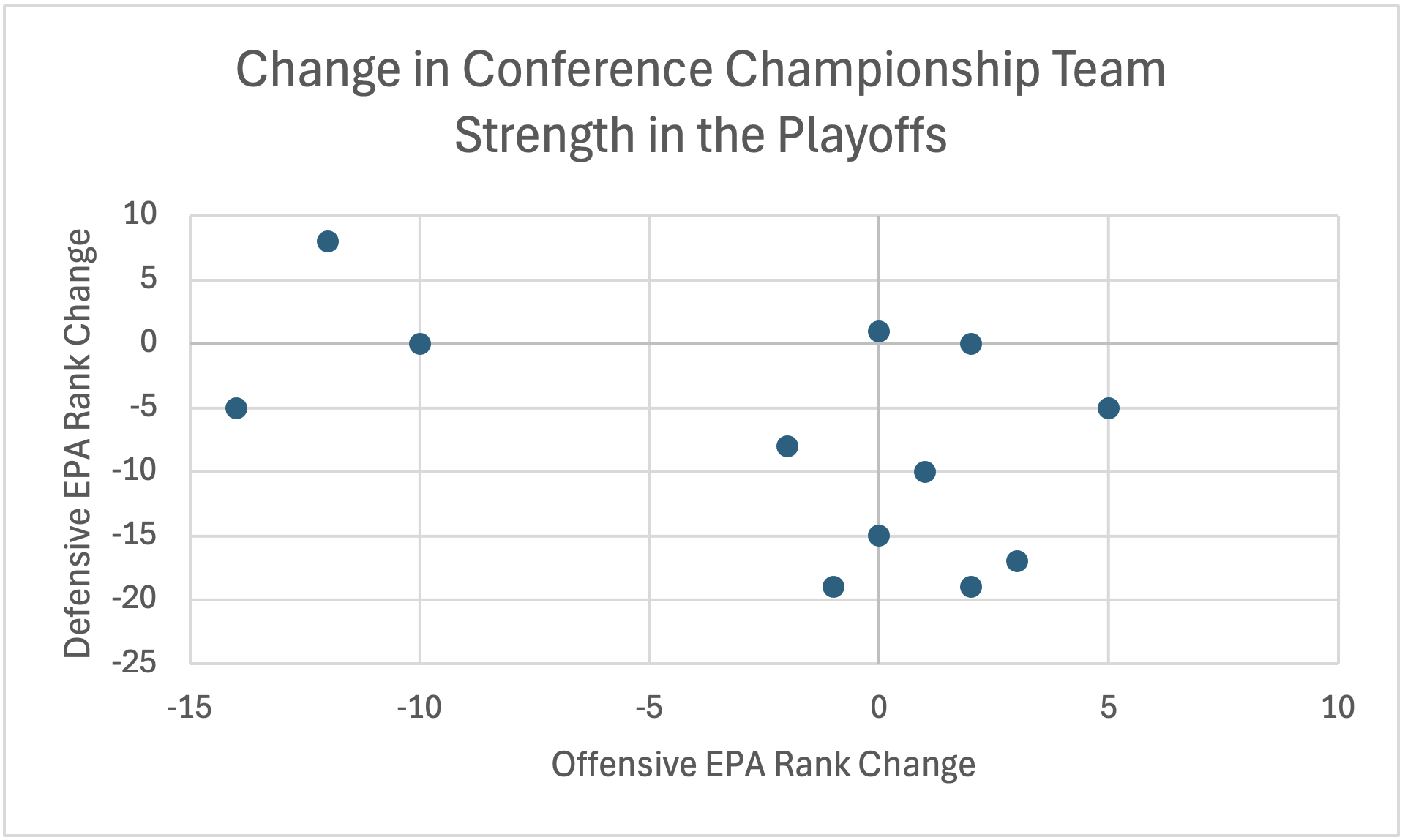
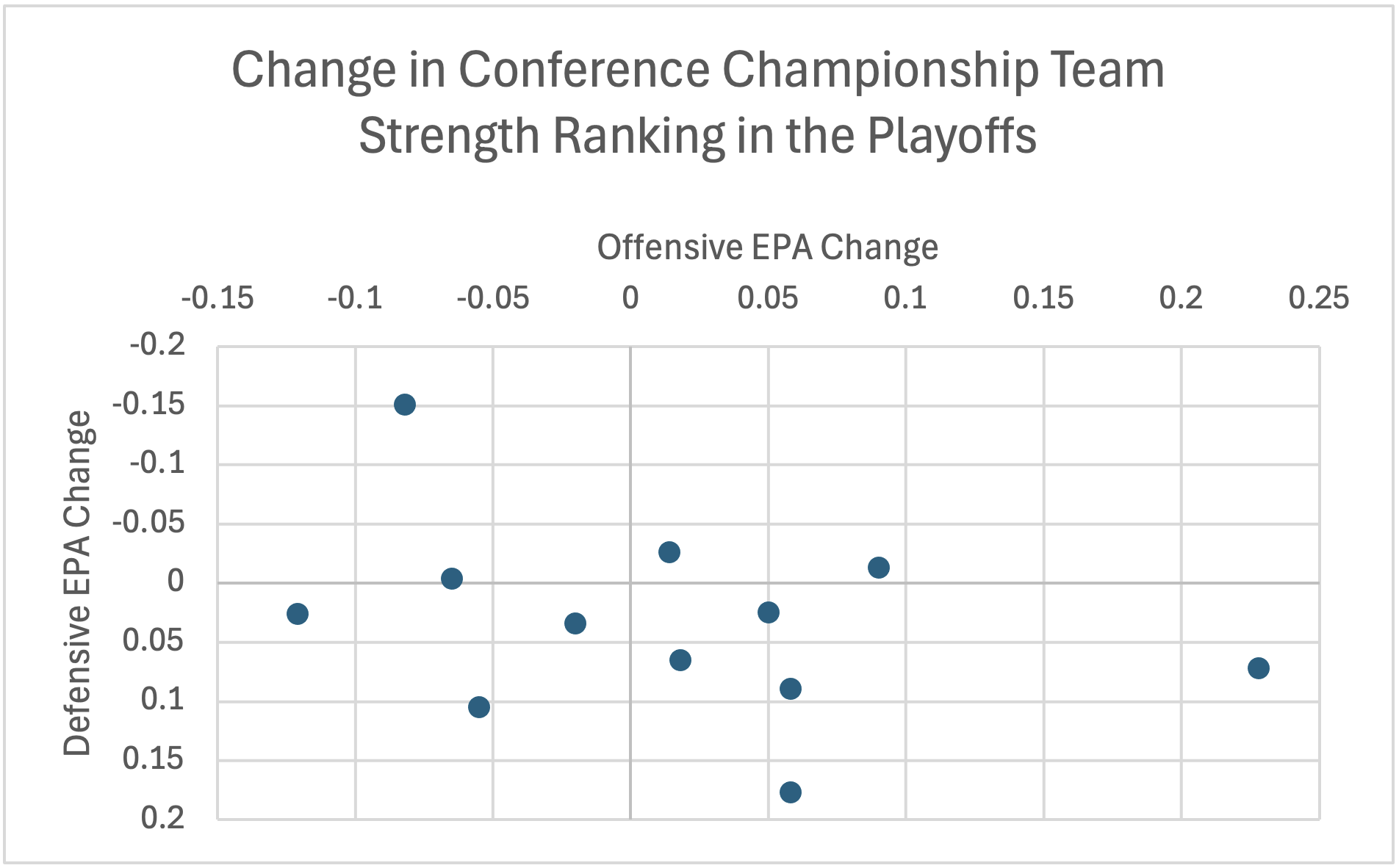
Of the teams to make a Super Bowl in the last six years, most did undergo change between their regular season and playoff performances. Contrary to the last example, though, most successful playoff teams actually got worse on defense, leaving that fascinating Rams team as an outlier. In reality, it was offenses that “got hot,” leading their teams to Super Bowl appearances. The only teams to win their conference that got worse on offense (outside of that strange 2021 Super Bowl) had such strong regular season performances that they simply couldn’t keep up the pace in the playoffs (‘18 LAR, ‘20 KC, ‘23 SF). Meanwhile, defensive deterioration in the playoffs is a usual phenomenon, 67% of both conference champions and Super Bowl winners’ defenses performing worse during the playoffs than regular season. As long as your offense plays at a high level in the playoffs, it really doesn’t matter all that much how good your defense is.
It could be argued that these stats are confounded – of course defenses play worse during the playoffs, they’re playing better offenses! If this were the case, though, it would be expected that the inverse is also true: offensive performance should degrade as well, assuming teams with better defenses make the playoffs. The fact of the matter is that defensive performance doesn’t matter as much as offense does in the playoffs; you can play worse than you did in the regular season, and still come away with conference and Super Bowl championships as long as your offense plays well. While defense absolutely matters in today’s NFL, the sentiment that it “wins championships” has become outdated. In today’s league, putting up points no longer just sells tickets; it hangs banners.

